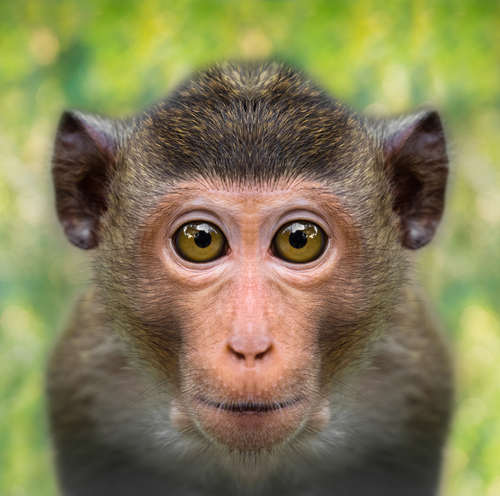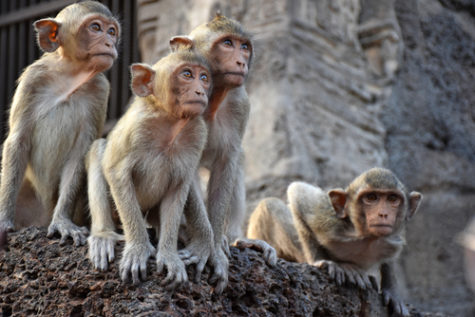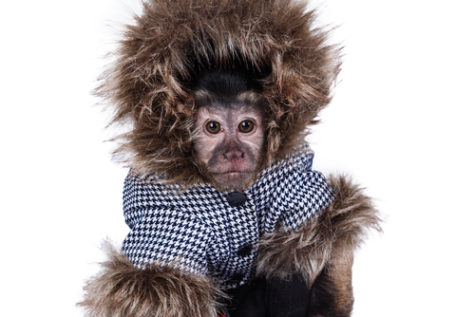 It was a sunny morning in Ton Sai Beach, Krabi, Thailand, 2003. The birds sang, the Andaman breeze blew its gentle perfumed air through the trees as I sat down to my morning banana pancake. Oblivious to the danger lurking above me. Watching. Waiting.
It was a sunny morning in Ton Sai Beach, Krabi, Thailand, 2003. The birds sang, the Andaman breeze blew its gentle perfumed air through the trees as I sat down to my morning banana pancake. Oblivious to the danger lurking above me. Watching. Waiting.
My girlfriend and I were on a yearlong rock climbing trip and, as I took my first few bites, we discussed our plans that day for climbing the sheer limestone walls lining the peninsula. Without a care in the world. Oh, to be so blissfully naive again.
On my third bite, it struck – moving silently along a nearby power line. With lust and hatred in its beady little eyes, it leapt from the line to the table and dove into the pancakes with those sweet, perfectly grilled banana slices nestled within.
It was the dreaded long-tailed macaque. That’s right. A monkey was stealing my pancakes.
It’s said that how we act in moments of crisis define us. I don’t know if that’s true. Some might call my actions that balmy morning heroic, but I’d like to think I did what any red-blooded, banana-loving tourist would do. I grabbed the butter knife and made several ferocious swings toward the monstrous hell-demon with naught but malice and bloodlust in its tiny heart.
But a creature of such murderous hatred is not so easily dissuaded. We locked eyes, gauging each other’s resolve. I’d like to think in that moment my soul was laid bare to that horrifying little monkey. His eyes narrowed and slowly, carefully, he reached down and took another handful of pancake.
Eventually, the waiters came and scared the cruel marauder away, but I would never be the same. Much like my pancake, my soul had been perforated by tiny primate hands and I was awakened to a world of monkey rage that has spread across the globe and claimed not only pancakes but also corn chips, wallets and testicles.
 If you wish to awaken to that world – to take the red pill, as it were – read on. But I warn you that were I given such a choice, I would give anything to return to blissfully ignorance of the horrors that surround us everyday – gnashing their teeth and throwing their tiny poop in our direction.
If you wish to awaken to that world – to take the red pill, as it were – read on. But I warn you that were I given such a choice, I would give anything to return to blissfully ignorance of the horrors that surround us everyday – gnashing their teeth and throwing their tiny poop in our direction.
Monkey-on-man violence is nothing new and is often said to arise from the fact that baby monkeys make adorable pets, though adult ones clearly do not. And oftentimes it is the owners who bare the brunt of the monkey rage. But like all forms of wanton violence, monkey violence can spill out into the unsuspecting populace.

For instance, in 1920, King Alexander of Greece was walking his prized German shepherds on the outskirts of Athens when he was attacked by crazed monkeys. Despite a valiant effort, his dogs were unable to protect him and the king suffered grievous wounds from the simian assassins. He later died of his wounds
That actually happened. The king of Greece was killed by monkeys.
Just four years later, Greece abolished its monarchy and declared itself a republic. And just ten years after that, Adolf Hitler was declared führer of Germany. Could these events have been connected? Maybe. Experts say that monkeys are highly intelligent and capable of future planning. I mean, not these experts, but other ones.
Since then, monkey-based violence has increased exponentially around the world. And by exponentially, I mean “a lot,” rather than the more specific, mathy definition. People have been attacked not only in rural tropical villages or zoos – where one might expect to find monkeys – but also in places like Paris, Los Angeles, and even at a cute little B&B in the Catskills. They may target your face or your hands or your ankles but their favorite meal is the male scrotum.
Nature simply hasn’t equipped humans with sufficient defenses against tiny, furry, teeth-filled missiles aimed at our crotches.
In one recent example out of Brazil, an intoxicated monkey even armed himself with a knife and terrorized an entire bar. “It was a bar staff oversight that ended with the monkey drinking some rum and taking the knife,” said the fire chief who rushed to the scene.
Monkey attacks can occur at any moment of the day, without provocation. You are not even safe walking down the street in a crowded shopping area, as seen in this terrifying, but also really funny, but mostly terrifying gif.
Or in this, equally alarming and not-at-all-hilarious, example
Don’t laugh. These creatures are dangerous. Gordon Grice, author of “The Book of Deadly Animals” aptly describes one species of macaque as “the size and temperament of a two-year-old human.” Think about that for a second. Imagine a toddler and then give him fangs, a prehensile tail and nearly limitless strength. Yeah. It’s that bad.
It was only a matter of time before organized crime recognized the power of monkey rage. In Paris, where weapons can be hard to come by, local thugs in the late 90s began using monkeys to rob people. This has led to a sort of arms race whereby ordinary citizens buy monkeys to protect themselves from criminal monkeys, forcing criminals to buy ever more powerful monkeys.
Today, it is generally thought by fairly clever people that 7 of the top 10 European crime families are headed by monkeys. Their grizzly work is often marked by the telltale use of testicle removal and the placement of banana peels around crime scenes. Which is both horrifying and a serious slipping hazard.

Here in the states, monkey violence is at a crisis level. About one in four Americans owns either a monkey or a gun and about 30,000 deaths are attributed to one or both of them. And no one is safe. In 2001, Salma Hayek was attacked by a capuchin monkey on the set of a movie. Salma Hayek! What did she ever do to hurt anyone?
Except being in “Grown Ups 2” – that was pretty bad.
One might argue that all of these attacks were the result of people either trying to own a wild animals in their homes or feeding them in the wild. One might also be a communist buzzkill trying to deny every American’s God-given right to own a wild animal that specifically targets our nads.
Either way, there is no political will in Washington today to pass legislation adequately protecting America from psychopathic monkeys. It’s clear that owning monkeys is an unavoidable part of modern civilization and that you can never know which of your friends or neighbors might have one. Perhaps even someone in your own home. Can you honestly look at your spouse and say for sure that he or she is not harboring a secret monkey?
So we are left with this chilling question. Is there a bloodthirsty monkey outside your house right now, waiting to prey on you and your family? The answer is yes – it is a distinct possibility.
Photo Credits: Shutterstock and via GIPHY
I like that their primary method of attack in those gifs appears to be a dropkick.
My cousin had a monkey as a pet. She finally got rid of him when people would stop visiting her.